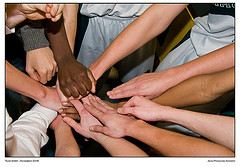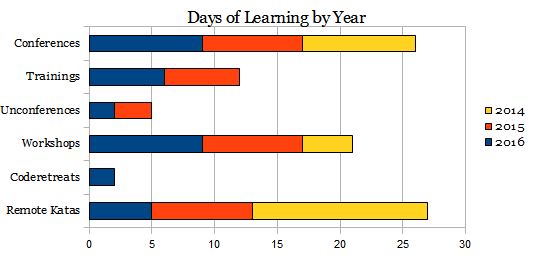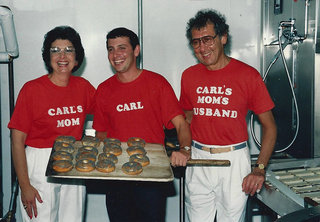
Last
DemoCamp a
fellow craftsman asked me how to find a proper employer to work for. How to find out if a team you are going to join is kicking ass? How to check if the future team mates are good people? (By our definition a good person cares about his or her work, doesn't rush, writes unit tests, keeps the code clean and does many other nice things. :-) So how to find out if you want to work with them? These are good questions.
Mindset
Applying for a job is symmetric which means it's a process working in both directions. Of course you try to prove yourself worthy of the new job. There are many resources on the internet that tell you how to
write your CV and how to behave during interviews, so you would not screw up. There are even guidelines for managers
which questions to ask including the
famous FizzBuzz. All these guides are targeting your value as employee and how to present it properly.
On the other hand your future employer has to show to you that he is worthy, too. The interviewer is his first representative and
must be prepared well and take the interview serious. Later he or she might tell you about the company's generous compensation scheme or the team or the development process to impress you. In the end of the interview you are usually asked if you have any questions. This is the time to ask and so I do. During the past years I have compiled a list of questions that I ask during interviews. Today I want to share some of them.
Process
I always start by asking the Joel Test. Although it
failed me in the past, I still believe it gives a good overview of the used development process. Then I ask the interviewer to define quality. Quality is perceived different by different people and the manager's idea of quality has considerable influence. Usually this leads to an interesting discussion if the manager is really interested in you.
 Team "Theory"
Team "Theory"
The team I'm going to work with is important to me and I start asking about it right away. "How large is it? How is it structured? When was it formed?" A team needs time to form and I like to join high performance teams. So is it a real team where each team member found its place or is it just a group of individuals sharing the same room? Starting a gig with setting up a new team is risky if you lack authority to influence future hiring decisions. The team might not end as you would like it to be.
Team Spirit
Next I try to figure out the team spirit. "When did the last person leave the team and why? Why is there an open position? Are there any contractors on the team?" A high percentage of contractors is a bad sign. First contractors do not fully participate in teams as their engagement feels more temporarily. Second most contractors I know either have no idea about coding or are extremely prolific but then their code looks like hell. (But I'm sure this is a coincidence.)
How Does it Feel?
If all things are going well you might be invited to meet the team, which in some cases has the final word in the hiring decision. And even if not,
a tour of the office never hurts. I always try to meet my future team mates and spend at least half of a day with them. How does it feel spending time with those people? Are they in a good mood or is there a dark cloud of fatalism hanging above them? Are they friendly and open minded? How do they communicate? You will spend a lot of time with them, so you better like them.
 What Do You Know?
What Do You Know?
During this time I "interview" my future colleagues. Well, it's not a real interview, more a chat to figure out what makes them special. My questions just guide me during these conversations. And I would also tell them things about myself. Most likely they know better than me if I fit into the open position and the team or not. To get started I'm looking for someone who knows more than me. In our technical domain it's very easy to know more in some area than most developers. "So what's your background? How long have you been developing software? What were your most exciting projects? Was it cool stuff? Were you excited about them?" (Did you care?)
As these people are developers, I get more technical and ask them about their favourite Java framework or library. I like language fundamentals so Apache Commons fit me perfectly, but that's just me. Everyone has his or her favourite toys. Think about them, discuss them. Are they esoteric, mainstream, fundamental, boring? On the other hand the similar question, which is the first library to add to a new project, has only one right answer. It's not Apache Commons and it's certainly not Spring or Hibernate, but it's JUnit. Even if you do not develop test driven, you will need it sooner or later. If we happen to talk about design I always ask "What's your favourite design pattern?" I hope it's not singleton, because
singletons are evil, all other answers usually lead to a good discussion about object orientation. After talking for some about what he knows and what I know I sum it up with my last question of this section, "What will I learn from you?"
Do You Care?
Next I'm looking for individuals that love to code, that care for their craft and are burning with enthusiasm. Asking about hobbies and how one spends his or her personal time doesn't sound related at first, but it is. The real question is if he or she does code on personal time, maybe is even an open source contributor. For example, some time ago I met an older guy and he didn't seem very enthusiastic. The whole team had impressed me so far and I was sure that he would just be a nine to five employee. I started asking him about his duties on the project but quickly moved to the area of personal time. It turned out he was into wireless network topology and played around with wireless infrastructure at home. He wasn't coding but still fooling around with technology. I was impressed.

Further I want to know "Which blogs do you read?" If you are interested in your craft you have to stay in touch, play around with new stuff and read books. The pragmatic programmers recommend reading four technical books each year. So "What was the last technical book you read?" Talking of books, "Who is Donald E. Knuth?"
What About Quality?
Ultimately I'm looking for software craftsmen and I wouldn't be genuine without diving into code quality and clean code. Everybody with just a faint interest in code quality, object orientation or self improvement knows Robert C. Martin, so I always ask if they know Uncle Bob. Finally I try to determine if I will hate this person every time he or she commits some changes to the repository: "What is most important about code? What is the worst defect for code? What is clean code for you?"
Warning
Let's finish with a word of caution: These questions help me figuring out if a future job is good for me but it's not foolproof. It happened that everything looked great and still the real
job experience was awful. Also be aware that these questions result from
my personal experiences. They need not to be good for you. Don't blame me if you end up in a group of coders from hell.
 I am supporting them since the very beginning. In fact I was playing with the idea of recording a monthly podcast already for some time. After my summer project I finally found the time to visit them during recording: We discussed the essence of Behaviour Driven Development, starting with Dan North's introductory article from 2006. It seems that we could not agree what the essence or core of BDD might be. In the second part we tried to answer the question if it is better to be a specialist or generalist in the field of software delivery. Of course the time was too short for such deep topics. ;-)
I am supporting them since the very beginning. In fact I was playing with the idea of recording a monthly podcast already for some time. After my summer project I finally found the time to visit them during recording: We discussed the essence of Behaviour Driven Development, starting with Dan North's introductory article from 2006. It seems that we could not agree what the essence or core of BDD might be. In the second part we tried to answer the question if it is better to be a specialist or generalist in the field of software delivery. Of course the time was too short for such deep topics. ;-)






























